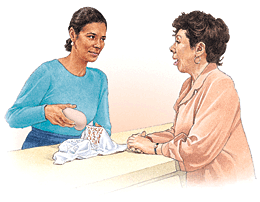Mastectomy: Healing at Home
After surgery, your body needs time to recover. You will receive information about helping your body heal. You may also be given a temporary prosthesis to wear during this time. And you'll learn what complications to watch for.
Note: In the future, tell all medical providers that you've had a mastectomy and on which side. You should not have a blood draw or IV line on that side.

Wearing a Prosthesis
After surgery, you may be given a temporary prosthesis. It's a soft breast form that fits into a bra. Some women wear breast forms to help balance weight and avoid back strain. Other women wear them for appearance. Talk to your doctor if you want a prescription for a permanent prosthesis. You may wear it when your incision feels less tender and swollen.
Seroma
A seroma is a large collection of fluid that occurs under the arm or the incision. It can appear 5 to 10 days after surgery. A small seroma is normal. It's likely to go away by itself in a few weeks. If you have a large seroma, your surgeon may drain (aspirate) it using a syringe and needle.
Lymphedema
Swelling of the arm on the side of surgery is called lymphedema. It occurs when the normal flow of lymph in the arm is reduced. This can happen if lymph nodes under the arm are removed or if the underarm is treated with radiation therapy. Lymphedema can occur long after surgery. To limit problems:
-
Slowly return to normal use of the arm on the side of the surgery.
-
Protect your hand and arm from infection. Wash your hands often. And wear gloves when cleaning or gardening.
-
Keep the fluid moving in your operated arm. Don't wear tight sleeves, elastic cuffs, bracelets, wristwatches, or rings on that arm.
-
Do exercises to help prevent swelling and improve circulation. For example, squeeze a rubber ball with your hand.
When to Call Your Doctor
Call your doctor right away if you have any of the following:
-
Fever of 101°F or higher
-
Cough, pain in the chest or calf, or shortness of breath
-
Increased pain, warmth, swelling, or redness near the surgical site
-
Drainage from the incision site
-
Bleeding that soaks the bandage
-
Seepage from the wound












